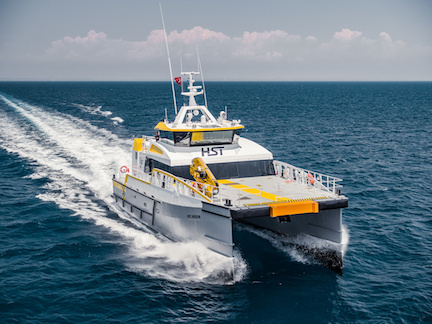(BOSTON) — Damen Shipyards Group will be present at the fourth annual U.S. Offshore Wind 2019 Conference and Exhibition on June 10-11 in Boston. Damen’s attendance reflects the company’s belief in the enormous potential of offshore wind in North America.
Damen has been an active player in the European offshore wind industry since its beginnings around a decade ago. Since then the company has built up a diverse portfolio of successful designs that can be deployed throughout the life cycle of an offshore wind farm.
“Importantly, these designs are proven solutions,” said Damen Director Business Development & Market Intelligence David Stibbe. Examples of successful Damen vessels can be seen throughout the European offshore wind industry. “These include vessels specifically designed for construction, installation, and cable-lay operations, in addition to crew transfer and operations and maintenance.”
Relevant Damen vessels for the North American market include 27-meter and 34-meter versions of the fast crew supplier (FCS) and the accommodation support vessel (ASV) 9020. The FCS 2710 and FCS 3410 can respectively carry 24 up to 80 technical personnel to their offshore work place in safety and comfort. Both these vessels benefit from Damen’s Sea Axe hull design which, in terms of both seakeeping and fuel consumption, provides the best of both worlds. The first ASV 9020 proved to be an effective and highly productive ‘walk-to-work’ vessel so swiftly that the launching customer ordered a second ship within a year of operations.
“It is important to emphasize that we are adjusting our designs to meet American regulations,” said Damen Area Manager North America Daan Dijxhoorn. “This includes responding to the specifications of ABS and the U.S. Coast Guard, as well as environmental regulations.”
The Jones Act is another U.S.-specific issue that Damen has several years’ experience with. To this end, the company has embraced the Jones Act by forming cooperative relationships with local American yards that have the capacity to build Damen designs. This process of building Damen vessels in local yards is called Damen Technical Cooperation (DTC).
“This is our unique selling point. We know how to deal with, and we have the flexibility to comply with, these local content regulations,” said Dijxhoorn. “This gives offshore wind developers wanting to use the same vessel designs that have proved themselves in the European market a lot of chances.”
The combination of Damen’s proven vessel designs and local construction methods will give the emerging North American offshore wind industry the means to benefit from the learning curve that the European offshore wind industry has experienced. “North American players will have the advantage of multiple lessons learned,” said Stibbe. “To this end, we are looking forward to working closely with the North American offshore wind industry.”

